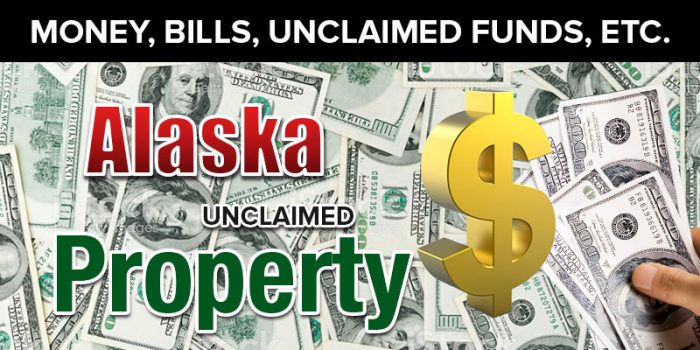
Contents
The Alaska Department of Revenue Treasury Division’s Unclaimed Property Program handles the state’s unclaimed property/ unclaimed money program. According to the State of Alaska, it has millions in assets waiting to be claimed. The Treasury Department wants to help reconnect actual owners with their abandoned money and property. The State of Alaska uses Missing Money to help operate a searchable database for its missing money program.

Search Public Records
There is some confusion about what unclaimed money is. Some people think that unclaimed money or unclaimed property are assets that have been abandoned by their owners and are up for grabs. While unclaimed money and property are abandoned property, the property still remains the legal property of the property owners. It is considered unclaimed money because the holder who has control of the money has lost contact with the property owner for a statutory period of time. Property is usually abandoned not because property owners want to abandon it, but because they have forgotten that they have the property. This means that most people should search for unclaimed property to determine whether or not they have unclaimed property.
Unclaimed property is generally the type of intangible personal property that can be easily converted into cash and can be held by a third-party holder in some type of account. Almost any type of property can become unclaimed property. The type of property likely to become unclaimed property include: stocks, bonds, mutual funds, utility deposits, bank accounts, traveler’s checks, payroll checks, and contents from safe deposit boxes. The contents of those safe deposits may be auctioned and converted into cash, which is then held for the property owner. There are some types of property that are exempt from the unclaimed money laws, including real property and motor vehicles.
Many people are familiar with the Missing Money website. This website consolidates the ability to search for missing money or unclaimed property in the United States. While it does not cover every state, there are 37 states that use the Missing Money website, in addition to some U.S. territories. You can search in Alaska and in multiple other states by going to the Missing Money website: www.missingmoney.com.
Searching for unclaimed property in Alaska is the same as searching for unclaimed property in any of the states that use the Missing Money website. However, we know not everyone has run a search on Missing Money. That is why we have created a step-by-step tutorial that shows you how to create a property search in Alaska. The tutorial will not only tell you each step, but contain screenshot pictures of each step, so that you can see how they should look. If you are looking for information on how to run unclaimed property searches in other states, you can look at our other tutorials, which include information on Missing Money states and states that have their own databases.
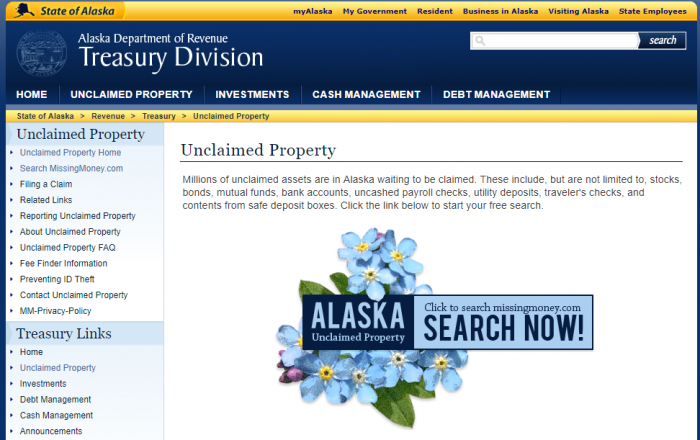
Alaska’s Unclaimed Property Database
Like other states, when Alaska initially began its unclaimed property program it was not handled at a statewide level. Instead, it was handled more on a local level. However, Alaska’s local divisions are significantly different from local divisions in other areas. Rather than being divided into the traditional counties or parishes one sees in other states, Alaska has boroughs and census areas. Not all of these areas even have a recognizable form of local government; in fact, many do not have any businesses that might be holders, but may be the homestead area for a property owner. However, Alaska’s statewide unclaimed property program has information for owners located in any part of Alaska, including: Aleutians East, Aleutians West, Anchorage, Bethel, Bristol Bay, Denali, Dillingham, Fairbanks North Star, Haines, Juneau, Kenai Peninsula, Kethikan Gateway, Kodiak Island, Lake And Peninsula, Matanuska-Sustina, Nome, North Slope, Northwest Arctic, Prince of Wales- Outer Ketchikan, Sitka, Skagway, Southeast Fairbanks, Valdez-Cordoza, Wade Hampton, Wrangell, and Yakutat.
What is Unclaimed Property?
Although each state has its own definition of unclaimed money, the concept of unclaimed or abandoned property is fairly consistent across states. In Alaska, unclaimed property may be tangible or intangible personal property that has been abandoned. For property to be abandoned, there does not need to have been an intent to abandon the property; the property owner simply needs to have lost contact with the holder of the property for a set period of time. Examples of unclaimed property include: bank accounts, wages, refunds, utility deposits, insurance proceeds, stocks, bonds, and the contents of safe deposit boxes.
How Much Unclaimed Money is in Alaska?
The State of Alaska only states that they have millions of dollars in unclaimed property, but it does not say how many millions. However, there is a significant amount of unclaimed property available in the United States. According to the National Association of Unclaimed Property Administrators (NAUPA), there is an estimated $42 billion available in unclaimed property.
Alaska’s Unclaimed Money Finder
You can look for unclaimed money in Alaska on www.MissingMoney.com. In addition to information from Alaska, you can find information from the following states, territories, and provinces: Alabama, Alberta Canada, Arizona, Arkansas, Colorado, District of Columbia, Florida, Idaho, Illinois, Indiana, Iowa, Kentucky, Louisiana, Maine, Maryland, Massachusetts, Michigan, Minnesota, Mississippi, Missouri, Montana, Nebraska, Nevada, New Hampshire, New Jersey, New Mexico, New York, North Carolina, North Dakota, Ohio, Oklahoma, Puerto Rico, Rhode Island, South Carolina, South Dakota, Tennessee, Texas, Utah, Vermont, Virginia, West Virginia, and Wisconsin. You can search for more information for your state by going to the state information page on the Missing Money website:
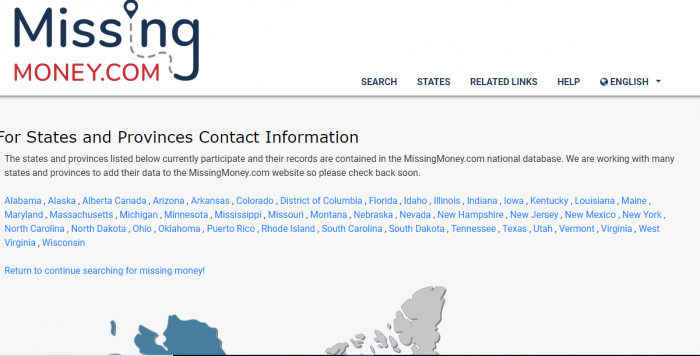
However, to run a search, you simply go to the search page of the Missing Money website, which allows you to simultaneously search all of the above states and territories:
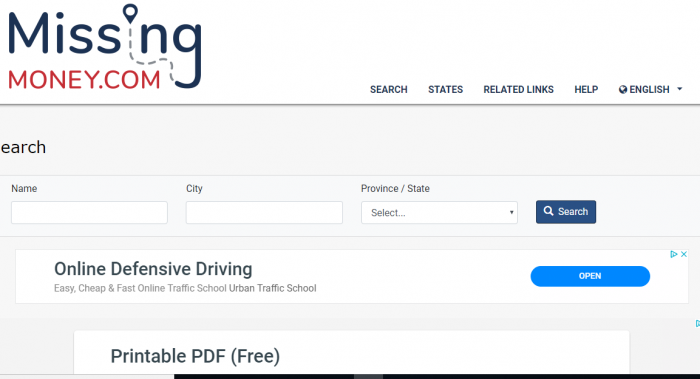
While the search allows you to search all of the territories simultaneously, it allows you to limit the search from the beginning. The initial search parameters you can enter include name, city, and province or state.
If you have visited any of our other tutorials, then you may already know that we use the same searches in all of our tutorials. We have chosen the common name Bob Smith for our examples. We chose a common name to make sure that we will get search results for our examples, but also because there are some pitfalls to watch out for when searching for a common name. The biggest risk is that there will be so many results for your search that it is impossible to go through all of them.
On Missing Money, they only detail up to 200 search results, and looking for the name Bob Smith yields more than 200 search results in Alaska:
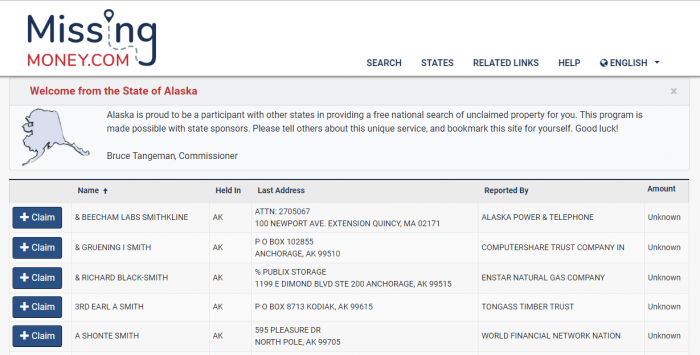
You can narrow it down by adding in the first name Bob and looking for the name Bob Smith in Alaska. In some states, using a full name does not have a meaningful impact on the number of search results. However, Alaska is a state with a small population. Using the name Bob Smith reduces the results down to 9 possible results:
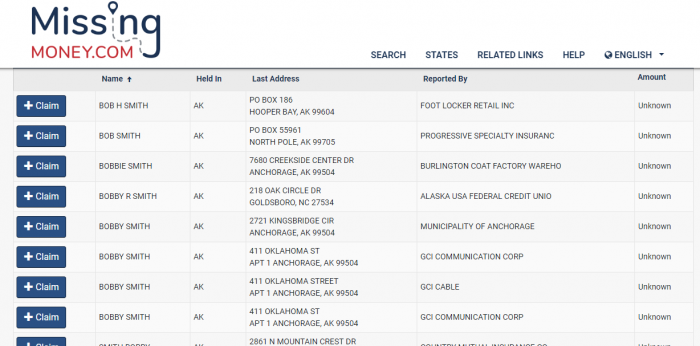
Although nine results is a very manageable number, we will narrow it down even more by searching by city. For example, we will include the city or Anchorage:
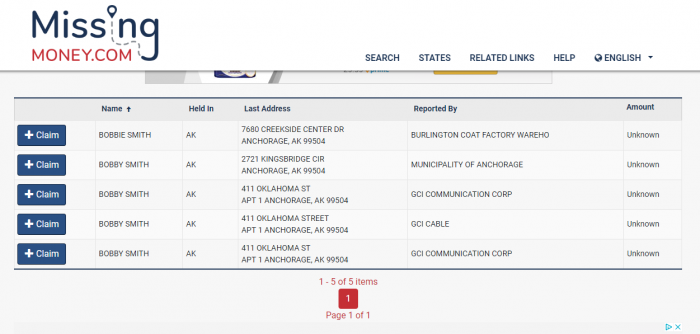
This results in the number of potential results being narrowed down to five. However, it is important to look at those results. Bob is generally a nickname for Robert, and you will notice that the results do not include any Roberts. If you want to make sure you get all of the search results, you need to search for every potential name, including full names, maiden names, and nicknames. Here are the results if we search for a Robert Smith in Anchorage, Alaska:
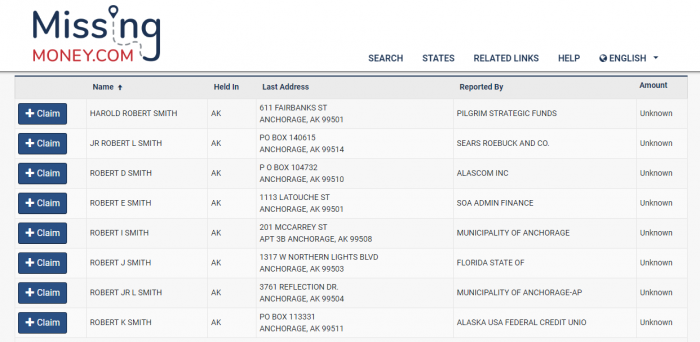
Doing this adds another potential 21 results.
Whatever name you look for, you will see the same information in your search results. There is a claim button on the left, the name of the property owner, the state where the property is being held, the property owner’s last known address, who reported the property (also known as the holder), and the amount of the claim if known.
If you want to claim the property, you will select the claim button in the left hand column. When you hit the claim button, you will notice the left hand column changes, to indicate that you are claiming that property:
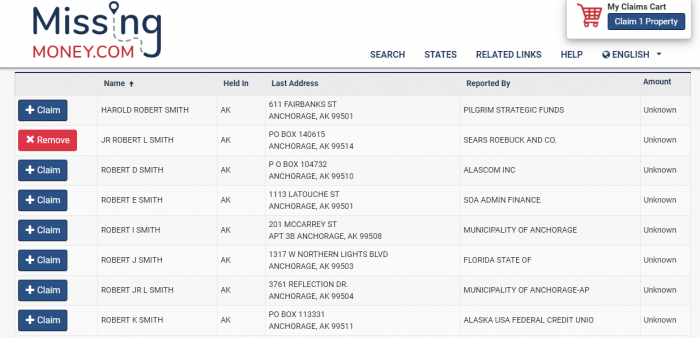
If you want to remove the property you have claimed, you hit the red remove button that appears after you have claimed the property.
Once you have selected all of the properties that you want to claim, you can go to the claims cart on the top right of the property to make the claim. You just hit the claim button. Different states have different claim processes, even if they are on the Missing Money site. Making a claim for property in Alaska, you get the following notice:
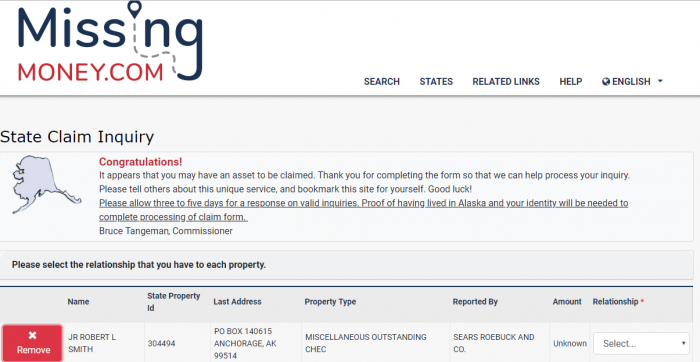
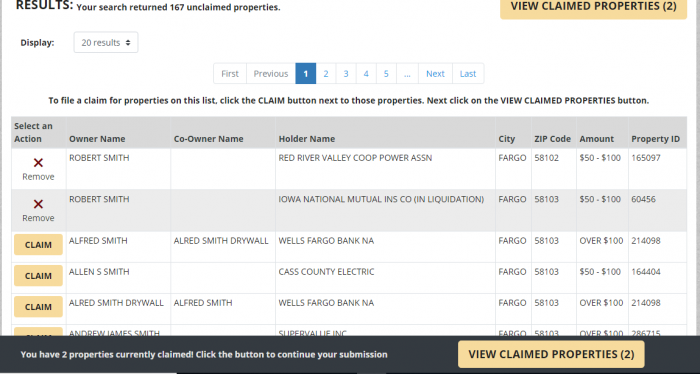
You are given information for how to file a claim form. It says that the state may take three to five days to respond to an inquiry. It also states that you will be asked for proof of identity and that you lived in Alaska.
The first step is that you are asked to choose your relationship to the property owner, whether it is as the owner, the heir, the executor, the corporate officer, or other:
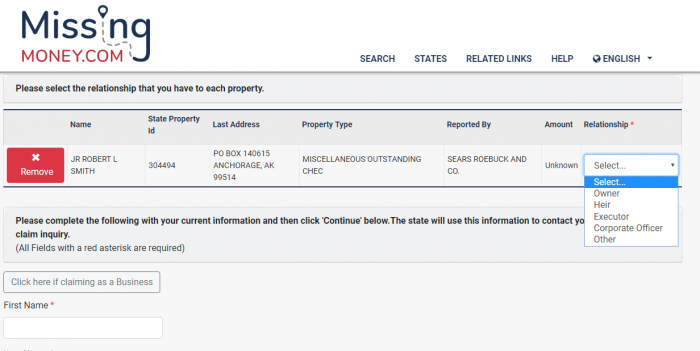
Then, you are asked to fill in a general information claim form, including the first name, last name, address, postal code, city, province or state, country, email, and phone number.
Once you fill in the claim form, the state reviews your claim and then contacts you within three to five days.
Unclaimed Money Laws in Alaska
Alaska’s Unclaimed Property Act is located in Alaska Statutes § 34.45.010.
Alaska Unclaimed Property FAQ
How long does Alaska hold unclaimed money?
Alaska will hold unclaimed money indefinitely for a property owner.
Examples of Unclaimed Money
In Alaska, both intangible and tangible property can be unclaimed property. There are two types of property exempted from unclaimed property: real property and motor vehicles. Some examples of unclaimed property include: checking accounts, savings accounts, stocks, dividends, bonds, uncashed checks, and property in safe deposit boxes.
Does the state of AK make efforts to locate owners?
While some states make significant outreach efforts to locate owners, Alaska is so vast that it really does not make a tremendous outreach effort. However, you can search on Missing Money to see if the state is holding any money for you.
Other sources to search besides AK state database?
For most people, an unclaimed property search is going to require more than just looking at the state’s unclaimed property database. Almost every person searching for unclaimed property is going to need to look at other sites. Some of these sites may include other state sites, while others may be some national sites.
When you are looking at other sites to examine, you need to consider what state sites you should search. Even though Alaska is on Missing Money and you can simultaneously search a number of different states, you may need to search some other states, as well. You want to include any states on this list where you have lived, where you have established business contacts, or where people may have put money in your name.
There are some non-state sites you want to search, as well. These include federal sites and national-sites maintained by private organizations. Which ones you should search are going to depend on what type of activities are in your past; there are some organizations that it makes sense for some people to search, but would not make sense for other people to search. That said, there are four sites we suggest for almost anyone to search: the Internal Revenue Service (IRS), the Pension Benefit Guaranty Corporation, the U.S. Treasury, and the Life Insurance Policy Locator.
While everyone knows what the IRS is, many people do not think of it as a holder or financial institution. The IRS collects taxes for all taxpayers in the United States and holds onto extra taxes until the taxpayer gets a refund. The IRS has a policy of not forwarding income tax refunds if a taxpayer has moved; it will not forward income tax return checks. You can read about the IRS’s policy on their website:
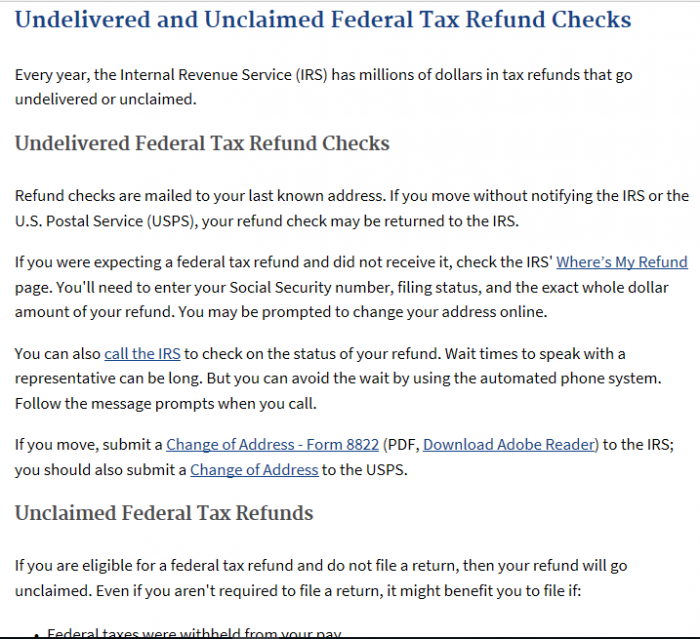
If you are expecting your tax refund, you can go to the IRS’s Where’s My Refund? page, to try to locate your missing income tax return:
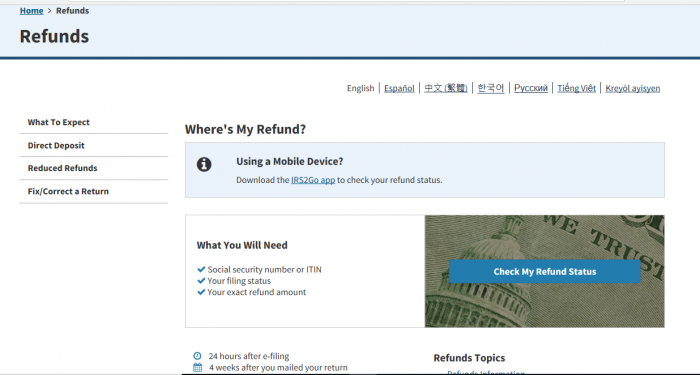
Another federal-level holder of money in the United States is the U.S. Treasury. People purchase U.S. Savings Bonds and other Treasury items from the Treasury, and, until these bonds are paid, the Treasury is the financial institution acting as the holder for that money. It used to be simple for people to use the Treasury Department’s website to track down missing money. However, the Treasury discontinued the searchable database that it operated, which makes it more difficult for people to locate their missing money. You can still contact the U.S. Treasury for information on how to find and claim any unclaimed money. You can call them at 844-284-2676 or visit them online at the Treasury Direct website:
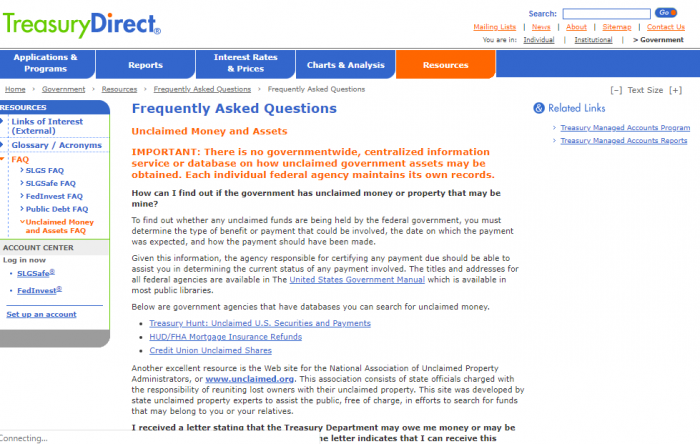
While not as well-known as the IRS or the U.S. Treasury, there is a third federal level site that most people should check if they are looking for unclaimed money: Pension Benefit Guaranty Corporation (PBGC). The PBGC is a federal-level, government-run corporation. Its purpose is to guarantee private pension benefits. In addition, the PBGC runs a searchable database, which is designed to help people locate missing pension benefits:
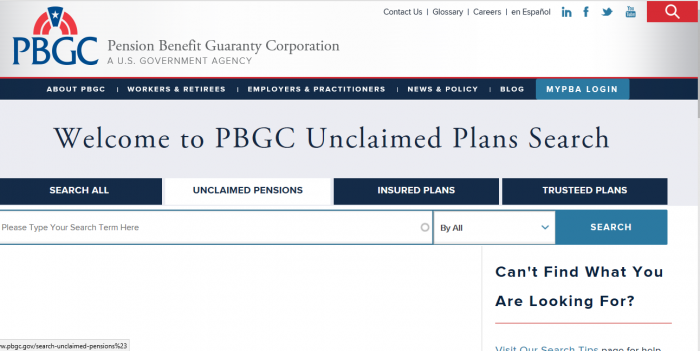
The final national-level site is not maintained by the federal government, but does operate on the national level. The National Association of Insurance Commissioners’ Life Insurance Policy Locator Service, is a national level organization that is a conglomerate of a number of life insurance companies in the United States. While its membership does not consist of every life insurance company in the United States, there are many of them involved and one of their member companies may be the holder of a policy where you are a named beneficiary or the heir to a named beneficiary. Their website works differently than the searchable missing property databases; you cannot search for potential properties, but you can input your information. The organization will then distribute the information you input to its member agencies, who will heck to see if you are beneficiary to any policies in their possession:
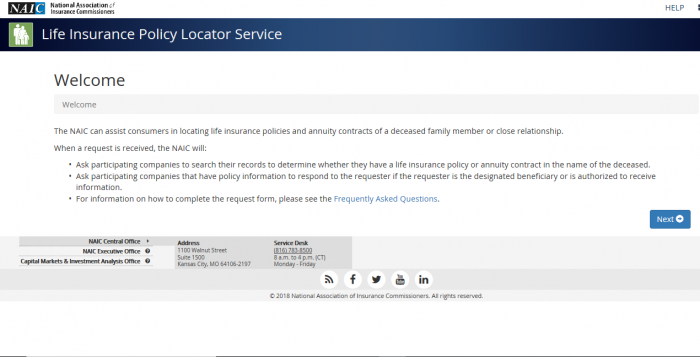
In addition to the above sites, you may need to look at some other sites, as well. This depends on the kinds of contact you may have had with other federal agencies. Some of these organizations include: the FDIC, the Department of Housing and Urban Development, the National Credit Union Administration, and the Veteran’s Administration Benefits Department.
What is the best way prevent my property from becoming lost or unclaimed?
One of the most frequently asked questions that we get is how a person can prevent property from becoming abandoned, lost, or unclaimed. The most important thing to do is to keep in contact with the holders of the property. Regularly contacting your financial institutions, informing the financial institutions if you have a change in contact information, and responding to attempts to contact you are all important in helping prevent your property from becoming lost. To help you with this, you should keep detailed account records for all of your financial accounts.
How do I make sure my heirs know where my assets are if I die?
A will is not sufficient to make sure your heirs known how to locate your assets; you need to designate a trusted person to have access to your accounts in the event that you die or are incapacitated.
Should I hire a finder to conduct the search?
Alaska allows people to work as finders for unclaimed property. It does not have any special requirements or licenses for people to be finders in the state. However, it does tell people to attempt to locate property on their own before signing a contract with a finder. There is no fee to file a claim or claim property using the Missing Money website. There are specific requirements for a fee finder contract in the state of Alaska.
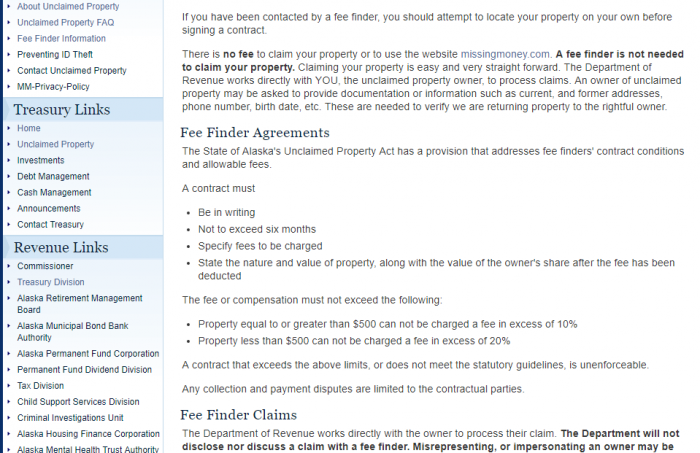
Why does Alaska take possession of unclaimed property?
The State of Alaska takes possession of unclaimed property for two reasons. It can use the revenue from unclaimed property, while still preserving property for the property owner. More importantly, by taking custody of unclaimed property, it can simplify the process of finding unclaimed property for people in Alaska.
Conclusion
You do not have to pan for gold to find hidden treasure in Alaska. You may have money waiting for you. A search on Missing Money only takes a few minutes, and is the easiest way to see if you have unclaimed property in Alaska.